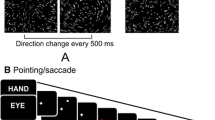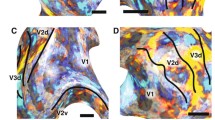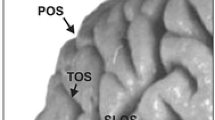Abstract
To date, the delineation of the human visual “motion area” still relies on functional paradigms originally devised to identify monkey area MT. Using fMRI, we have identified putative human area V5/MT+ in normals by modelling the BOLD responses to alternating radially moving and stationary dot patterns. Functional activations were compared with cytoarchitectonic probability maps of its putative correlate area hOc5, which was calculated based upon data from histological sections of ten human post-mortem brains. Bilateral visual cortex activations were seen in the single subject dynamic versus stationary contrasts and in the group random-effects analysis. Comparison of group data with area hOc5 revealed that 19.0%/39.5% of the right/left functional activation was assigned to the right/left hOc5. Conversely, 83.2%/53.5% of the right/left hOc5 was functionally activated. Comparison of functional probability maps (fPM) with area hOc5 showed that 28.6%/18.1% of the fPM was assigned to hOc5. In turn, 84.9%/41.5% of the area hOc5 was covered by the respective fPM. Thus, random-effects data and fPMs yielded similar results. The present study shows for the first time the correspondence between the functionally defined human V5/MT+ and the post-mortem cytoarchitectonic area hOc5.




Similar content being viewed by others
References
Allman JM, Kaas JH (1971) A representation of the visual field in the caudal third of the middle temporal gyrus of the owl monkey (Aotus trivirgatus). Brain Res 31(1):85–105
Amunts K, Malikovic A, Mohlberg H, Schormann T, Zilles K (2000) Brodman’s areas 17 and 18 brought into stereotaxic space. Where and how variable? NeuroImage 11:66–84
Annese J, Gazzaniga MS, Toga AW (2005) Localization of the human cortical visual area MT based on computer aided histological analysis. Cerebral Cortex 15(7):1044–1053
Beauchamp MS, Cox RW, DeYoe EA (1997) Graded effects of spatial and featural attention on human area MT and associated motion processing areas. J Neurophysiol 78:516–520
Brett M (2002) http://www.mrc-cbu.cam.ac.uk/Imaging/Common/mnispace.shtml
Collins DL, Neelin P, Peters TM, Evans AC (1994) Automatic 3D intersubject registration of MR volumetric data in standardized Talairach space. J Comput Assist Tomogr 18(2):192–205
Dukelow SP, De Souza JFX, Culham JC, van den Berg AV, Menon RS, Vilis T (2001) Distinguishing subregions of human MT+ complex using visual field and pursuit eye movements. J Neurophysiol 86:1991–2000
Dumoulin SO, Bittar RG, Kabani NJ, Baker CL Jr, Le Goualher G, Pike GB, Evans AC (2000) A new anatomical landmark for reliable identification of human area V5/MT: a quantitative analysis of sulcal patterning. Cereb Cortex 10:454–463
Dupont P, Orban GA, Vogels R, Bormans G, Nuyts J, Schiepers C, De Roo M, Mortelmans L (1993) Different perceptual tasks performed with the same visual stimulus attribute activate different regions of the human brain: a positron emission tomography study. PNAS 90:10927–10931
Dupont P, Orban GA, de Bruyn B, Verbruggen A, Mortelmans L (1994) Many areas in the human brain respond to visual motion. J Neurophysiol 72:1420–1424
Dupont P, de Bruyn B, Vandenberghe R, Rosier A-M, Michiels J, Marchal G, Mortelmans L, Orban GA (1997) The kinetic occipital region in human visual cortex. Cereb Cortex 7:283–292
Eickhoff SB, Stephan KE, Mohlberg H, Grefkes C, Fink GR, Amunts K, Zilles K (2005) A new SPM toolbox for combining probabilistic cytoarchitectonic maps and functional imaging data. NeuroImage 25:1325–1335
Evans AC, Marrett S, Neelin P, Collins L, Worsley K, Dai W, Milot S, Meyer E, Bub D (1992) Anatomical mapping of functional activation in stereotactic coordinate space. NeuroImage 1:43–53
Fink GR, Halligan PW, Marshall JC, Frith CD, Frackowiak RS, Dolan RJ (1996) Where in the brain does visual attention select the forest and the trees? Nature 382:626–628
Flechsig P (1927) Meine myelogenetische Hirnlehre mit biographischer Einleitung. Springer, Berlin
Friston KJ, Holmes A, Poline J-B, Price CJ, Frith CD (1996) Detecting activations in PET and fMRI: Levels of inference and power. NeuroImage 4:223–235
Goebel R, Khorram-Sefat D, Muckli L, Hacker H, Singer W (1998) The constructive nature of vision: direct evidence from fMRI studies of apparent motion and motion imagery. Eur J Neurosci 10:1563–1573
Hasnain MK, Fox PT, Woldorff MG (1998) Intersubject variability of functional areas in the human visual cortex. Hum Brain Map 6:301–315
Heilman KM, Van den Abell T (1980) Right hemisphere dominance for attention: The mechanism underlying hemispheric asymmetries of inattention (neglect). Neurology 30:327–330
Holmes CJ, Hoge R, Collins L, Woods R, Toga AW, Evans AC (1998) Enhancement of MR images using registration for signal averaging. J Comput Assist Tomogr 22:324–333
Huk AC, Dougherty RF, Heeger DJ (2002) Retinotopy and functional subdivision of human areas MT and MST. J Neurosci 22:7195–7205
Kastner S, De Weerd P, Desimone R, Ungerleider LG (1998) Mechanisms of directed attention in the human extrastriate cortex as revealed by functional MRI. Science 282:108–111
Malikovic A, Amunts K, Schleicher A, Mohlberg H, Palomero-Gallagher N, Schormann T, Zilles K (2001) Cytoarchitecture and stereotactic location of a preoccipital area in the region of V5/MT. NeuroImage 13:S909
Marshall JC, Fink GR (2001) Spatial cognition: where we were and where we are. Neuroimage 14:2–7
Maunsell JHR, Nealey TA, DePriest DD (1990) Magnocellular and parvocellular contributions to responses in the middle temporal visual area (MT) of the macaque monkey. J Neurosci 10:3323–3334
Mugler JP 3rd, Brookeman JR (1990) Three-dimensional magnetization-prepared rapid gradient-echo imaging (3D MP RAGE). Magn Reson Med 15(1):152–157
O’Craven KM, Rosen BR, Kwong KK, Treisman A, Savoy RL (1997) Voluntary attention modulates fMRI activity in human MT-MST. Neuron 18:591–598
Oldfield RC (1971) The assessment and analysis of handedness: The Edinburgh inventory. Neuropsychologia 9:97–113
Rees G, Friston K, Koch C (2000) A direct quantitative relationship between the functional properties of human and macaque V5. Nature Neuroscience 3(7):716–723
Schleicher A, Amunts K, Geyer S, Morosan P, Zilles K (1999) Observer-independent method for microstructural parcellation of cerebral cortex. A quantitative approach to cytoarchitectonics. NeuroImage 9:165–177
Smith AT, Greenlee MW, Singh KD, Kraemer FM, Hennig J (1998) The processing of first- and second-order motion in human visual cortex assessed by functional magnetic resonance imaging fMRI. J Neurosci 18:3816–3830
Sunaert S, van Hecke P, Marchal G, Orban GA (1999) Motion-responsive regions of the human brain. Exp Brain Res 127:355–370
Talairach J, Tournoux P (1988) Co-planar stereotaxic atlas of the human brain: 3-dimensional proportional system—an approach to cerebral imaging. Thieme, New York
Toga AW, Thompson PM (2003) Mapping brain asymmetry. Nat Rev Neurosci 4:37–48
Tootell RBH, Reppas JB, Kwong KK, Malach R, Born RT, Brady TJ, Rosen BR, Belliveau JW (1995) Functional analysis of human MT and related visual cortical areas using magnetic resonance imaging. J Neurosci 15(4):3215–3230
Watson JDG, Myers R, Frackowiak RSJ, Hajnal JV, Woods RP, Mazziotta JC, Shipp S, Zeki S (1993) Area V5 of the human brain: evidence from a combined study using Positron Emission Tomography and Magnetic Resonance Imaging. Cereb Cortex 3:79–94
Wohlschläger AM, Specht K, Lie C, Wohlschläger A, Bente K, Pietrzyk U, Stöcker T, Zilles K, Amunts K, Fink GR (2005) Linking retinotopic fMRI mapping and anatomical probability maps of human occipital areas V1 and V2. NeuroImage 26(1):73–82
Yarbus AL (1967) Eye movements and vision. Plenum Press, New York
Zeki S (1974) Functional organization of a visual area in the posterior bank of the superior temporal sulcus of the rhesus monkey. J Physiol 236:549–573
Zeki S, Watson JDG, Lueck CJ, Friston KJ, Kennard C, Frackowiak RSJ (1991) A direct demonstration of functional specialization in human visual cortex. J Neurosci 11(3):641–649
Zeki S (1993) A Vision of the Brain. Blackwell Scientific Publications, Oxford
Zilles K, Dabringhaus A, Geyer S, Amunts K, Qu M, Schleicher A, Gilissen E, Schlaug G, Steinmetz H (1996) Structural asymmetries in the human forebrain and the forebrain of non-human primates and rats. Neurosci Biobehav Rev 20(4):593–605
Acknowledgements
We are grateful to our colleagues from the MR and Cognitive Neurology group for their assistance. Gereon R. Fink is supported by the Deutsche Forschungsgemeinschaft (DFG KPO-112, TP1 and TP8).
Author information
Authors and Affiliations
Corresponding author
Rights and permissions
About this article
Cite this article
Wilms, M., Eickhoff, S.B., Specht, K. et al. Human V5/MT+: comparison of functional and cytoarchitectonic data. Anat Embryol 210, 485–495 (2005). https://doi.org/10.1007/s00429-005-0064-y
Published:
Issue Date:
DOI: https://doi.org/10.1007/s00429-005-0064-y




